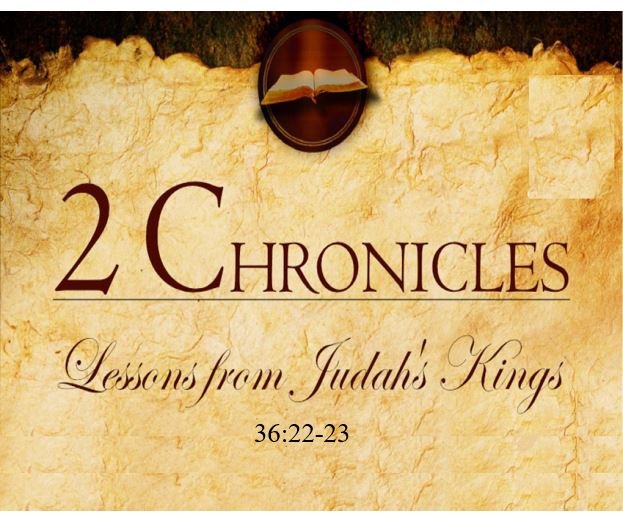BIG IDEA:
THE END BECOMES THE NEW BEGINNING
INTRODUCTION:
Raymond Dillard: Concluding the narrative with these two verses highlights the hopefulness already intimated in 36:20–21 and directs the reader to the continuation of the narrative in Ezra. The book ends with a new exodus at hand: not because God forced the hand of a reluctant Pharaoh, but because he moved the heart of a Persian king. The people of God will again go free and build a sanctuary.
J.A. Thompson: The Lord had appointed Cyrus to build a temple for him in Jerusalem. In fact, the tabernacle and the first and second temples were all built in part with funds provided by Gentile nations. Cyrus’ authorization for the rebuilding of the temple included not only the building but also the return of the implements taken from the first temple by Nebuchadnezzar and the funding of the project from the Persian treasury (Ezra 6:4-5).
The book thus ends with the possibility of a new exodus. As God had once forced the hand of a reluctant pharaoh, now he moved the heart of a Persian king. The Book of Chronicles thus ends with the promise that the people of God would again go free to build a sanctuary where they could worship him in the land he had promised to their ancestors.
Matthew Henry: These last two verses of this book have a double aspect.
1. They look back to the prophecy of Jeremiah, and show how that was accomplished, 2 Chron. 36:22. God had, by him, promised the restoring of the captives and the rebuilding of Jerusalem, at the end of seventy years; and that time to favour Sion, that set time, came at last. After a long and dark night the day-spring from on high visited them. God will be found true to every word he has spoken.
2. They look forward to the history of Ezra, which begins with the repetition of 2 Chron. 36:22, 23; Ezra 1:1-3.
They are there the introduction to a pleasant story; here they are the conclusion of a very melancholy one; and so we learn from them that, though God’s church be cast down, it is not cast off, though his people be corrected, they are not abandoned, though thrown into the furnace, yet not lost there, nor left there any longer than till the dross be separated. Though God contend long, he will not contend always. The Israel of God shall be fetched out of Babylon in due time, and even the dry bones made to live. It may be long first; but the vision is for an appointed time, and at the end it shall speak and not lie; therefore, though it tarry, wait for it.
Thomas Constable: These two verses reflect the whole mood of Chronicles. Rather than ending with the failure of people, the writer concluded by focusing attention on the faithfulness of God (cf. Lam. 3:22-23). God was in control of the Persian king as He had controlled the kings of Babylon, Egypt, and Israel. God had promised Israel a future as a nation. His people would experience this future under the rule of a perfect Davidic Son. Yahweh was moving now—after 70 years of captivity—to bring that future to pass (cf. Isa. 9:7). Even though the Babylonian army had burned Yahweh’s temple to the ground (v. 19), it would rise again (v. 23).
I. (:22a) TIMING OF THE EDICT OF CYRUS
“Now in the first year of Cyrus king of Persia—“
II. (:22b) PROPHETIC BACKGROUND TO THE EDICT OF CYRUS
“in order to fulfill the word of the LORD by the mouth of Jeremiah—“
III. (:22c) DRIVING FORCE BEHIND THE EDICT OF CYRUS
“the LORD stirred up the spirit of Cyrus king of Persia, so that he sent a proclamation throughout his kingdom, and also put it in writing, saying,”
IV. (:23) SUBSTANCE OF THE EDICT OF CYRUS
“Thus says Cyrus king of Persia,”
A. Position of Worldly Dominion
“The LORD, the God of heaven, has given me all the kingdoms of the earth,”
B. Privilege of Divine Commissioning to Build God’s Temple in Jerusalem
“and He has appointed me to build Him a house in Jerusalem,
which is in Judah.”
Martin Selman: “To build him a house” is a deliberate echo of the central promise of the Davidic covenant (cf. 1 Chronicles 17:11-12; 22:10; 28:6; 2 Chronicles 6:9-10). Cyrus of course is thinking only of the house in Jerusalem, but in the Chronicler’s thought this phrase is inevitably connected with both houses of the Davidic covenant, the dynasty as well as the temple.
C. Proclamation Encouraging the Jewish Exiles to Return and Build
“Whoever there is among you of all His people,
may the LORD his God be with him,
and let him go up!”
J. Sidlow Baxter: Most of all, may that central message of the Chronicles grip our minds, namely, that response to God is the really decisive factor. It is true both nationally and individually. It was true of old: it is true today. The first duty and the only true safety of the throne lies in its relation toward the temple. Our national leaders of today might well ponder that fact. When God is honoured, government is good and the nation prospers. But when God is dishonoured, the cleverest statesmanship cannot avert eventual disaster. The call to our nation today, as clearly as in the Edict of Cyrus quoted at the end of 2 Chronicles, is to “go up” and REBUILD THE TEMPLE.

